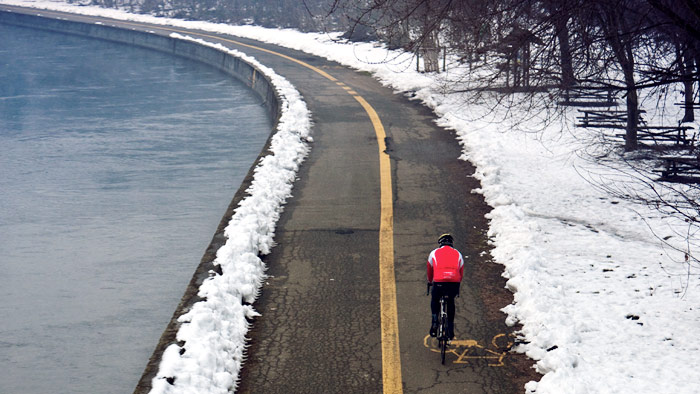What were the last five objects or surfaces you touched? When was the last time you touched your face or put something in your mouth? How long has it been since you washed your hands? See where we’re going with this? If you’re like a lot of people, you don’t spend a lot of time thinking about what you’re touching from moment to moment, but during cold and flu season these habits can make a big difference in your ability to stay healthy.
Simple Precautions
I’m not a germaphobe and I don’t think any athlete, or any reasonably healthy person for that matter, needs to seal themselves in a bubble to avoid germs. You have an immune system for a reason, and it generally works well. That said, cold and flu season presents some unique challenges to an athlete’s immune system, so a bit more vigilance might be a good idea. As an athlete, training sessions can suppress your immune system, making you more susceptible to infection for a day after training or up to three days following harder, more stressful training sessions. Hard training blocks can have the same impact, even if the individual workouts are relatively short (1 to 2 hours each). Try to use the following precautions to help you stay healthy:
- Wash your hands frequently, especially before eating. Regular soap and water work wonders.
- Use hand sanitizer if you can’t wash with soap and water.
- Get a flu shot. Consult your physician first, of course. Many athletes who are generally healthy resist getting a flu shot because they don’t have a compromised immune system. But getting the flu will knock your training back by at least two weeks and a flu shot not only protects you, it helps protect more vulnerable people you come in contact with.
- Minimize time spent in crowds, especially indoors and in small spaces.
- Try not to touch your face or put your fingers in your mouth or nose.
- Don’t share food or drinks with friends, and avoid communal foods (chips, dips, nuts, candy, etc.).
- Stay hydrated. Mucus membranes in the nose and throat don’t work as well when they’re dry, so staying hydrated helps your natural defenses work better.
- Sleep more! Even if you can add one more hour of sleep to your normal routine, the added recovery makes you less susceptible to infection.
- Reduce lifestyle stress. All stress (training, lifestyle, nutrition, etc.) takes a toll on immune function, so if you’re training hard make an extra effort to reduce stress in other areas.
Pro Level Precautions
There’s an additional list of precautions we give elite athletes, especially during high-stress periods of training or in the final weeks leading up to an important event (like a once-a-year World Championship or once-every-four-years Olympic Games). If you have a major competition coming up, these might be worth incorporating in the final 14 days beforehand. Note, these are just cold/flu precautions. There are additional recommendations for avoiding food-borne illnesses before major events.
- Don’t shake hands. If you need to physically greet someone, use a fist bump to restrict contact with another person to the backside of your hand.
- Always have your own pen. Whether it’s for autographs or signing a credit card receipt, at least you know where your pen has been.
- Carry your own flatware. Those disposable, packaged flatware sets from take-out restaurants are a great option.
- Drink bottled beverages you can open yourself, from the bottle, to minimize contact with reusable glassware.
Using Nutrition to Stay Healthy
Nutrition plays a role in protecting you from getting a cold, but mostly from the standpoint of supporting your activity level so that you’re not energy deficient. Athletes who are proactively trying to lose weight can be at particular risk because they are often training hard and restricting calories, which can negatively impact immune system function.
The Use of Supplements
A lot of athletes swear by Vitamin C. The science around consuming a large quantity (Emergen-C contains 1000mg ascorbic acid) of vitamin C has been debated since Linus Pauling first suggested it should be used to prevent and reduce the severity of the common cold. Review studies that aggregate the results of previous research indicate it might work, but that it’s more likely to work in children and populations under higher amounts of stress… like athletes in training! So, should you supplement with mega-doses of Vitamin C? In principal (and for the reasons discussed below) I would rather athletes increase their intake of foods rich in Vitamin C, especially since those foods– including citrus, peppers, kiwi, strawberries, and dark green leafy vegetables like kale– also mean an increase in your fruit and vegetable intake. But since we’re talking about supplements…
A Word of Caution
Supplements, over-the-counter cold and flu medications, and prescription medications for cold and flu can all contain substances on the WADA Prohibited Substances List. USA Cycling, USA Triathlon, and other federations governing amateur competitions are stepping up testing of amateur and age group athletes. This is a great step forward in the fight against doping, but for a lot of amateur athletes anti-doping regulations aren’t top-of-mind when buying herbal supplements, cold medication, or filling a doctor’s prescription. If you’re going to participate in competitions, even if you’re a 50-year-old mid-pack Cat 4, you should be following both the spirit and the letter of the rules. The safest route is not to take any supplements (they are unregulated, may be contaminated, and may not contain what is listed on the label), consult the 2016 USADA Athlete Guide, and check any medication you plan on taking, even the ingredients in over-the-counter cold and flu medications, against the prohibited list and the Global DRO (drug reference online). If you really want to take supplements, consult USADA’s Supplement 411 resources and consider supplements that are NSF Certified for Sport®.
If You Do Get Sick
In light of the warnings above, the best things an athlete can do to combat the common cold are get more rest, stay well hydrated, and wait it out. Tamiflu, the medication that may reduce the duration and severity of the flu if taken within 48 hours of onset, is not on the 2016 WADA Prohibited List. If you have a fever or are ill enough to consider taking cold medication, rest is going to do you more good than training. If your symptoms are all above the neck, a recovery-paced ride may help you feel better, but if your symptoms are below the neck stick with rest. When in doubt always chose to rest. Return to light training once you’re asymptomatic for at least a full day, and in the days following that don’t try to make up for lost time by piling on extra training volume or intensity. Too much workload too soon after an illness puts stress on an already overworked immune system and you’re more likely to get sick again.
Using a few simple guidelines can prevent you from coming down with the latest illness going around. If you do find yourself battling an illness, remember that rest is your best course of action. Taking these steps will allow you to train more consistently to reach your goals.
Noah Collins also contributed to this article. Collins is an Expert Coach for Carmichael Training Systems (CTS). With an undergraduate degree in biochemistry and a Master’s of Education degree in Exercise Science, Noah’s background in research informs his coaching for cyclists, triathletes, and a wide range of endurance athletes.


